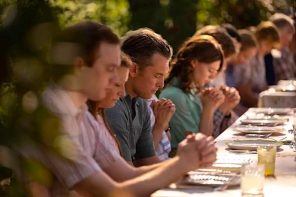“There are two ways through life: the way of nature, and the way of grace. You have to choose which one to follow.” So says the figure of the universal mother, the goddess, and the Virgin Mary embodied and refracted through the person of a 1950s mother, in Terrence Malick’s incredible and very long-awaited film about life, the universe, and everything, The Tree of Life. The film is a significant work of American religious cinema (when’s the last time I wrote that?) and a must-see for all who style themselves religious progressives.
The Sweep of Cosmic History
I won’t dwell on the film’s four-decade-long gestation period, or the reclusive ways of its writer-director. These details seem like diversions—ways to avoid talking about what the film is about, which is God and grace and justice and growing up. Structured around a family (mother, father, three children) which suffers a terrible loss, The Tree of Life is an extended midrash, or commentary, on the Book of Job, a verse of which forms the epigraph to the film and which is sermonized upon during an extended scene at a church. At once essentially Catholic and doggedly scientific in its worldview, its central family becomes an archetype, undergoing processes of childlike wonderment, Oedipal lust and rage, the loss of innocence, the loss of faith, and finally, it seems, redemption.
These are big themes, and The Tree of Life is a big movie. But I didn’t find it preachy or treacly; Malick is just too beautiful a filmmaker to let that happen. As in his past films, such as Days of Heaven (1978) and The Thin Red Line (1998), Malick shows rather than tells his religious/mystical sensibility. At least as much time is devoted to gazing upward at trees or running through grass (a recurrent trope in all Malick’s films) as to conventional depictions of plot and character. Emmanuel Lubezki’s luscious cinematography (notice that I’m mentioning the film’s cinematographer before Brad Pitt or Sean Penn, two of its stars) is like Rudolf Otto or Abraham Joshua Heschel realized onscreen. We gaze at sunsets, galaxies, even CGI dinosaurs through the eyes of a child, with what Ricoeur called the “second naivete” of the mystic, rather than the merely faithful.
All this montage, voiceover, and elliptical storytelling will not sit well with those who crave linear narrative and Hollywood’s three-act formula. But the medium fits the theological message, which hovers in the oscillation between the sweep of cosmic history (the film stretches from the dawn of time until the eschaton, although most of it centers on the family narrative) and the infinitesimal yet infinitely significant drama of human affairs. This is familiar territory, particularly for Americans, fed as we are on a dueling diet of Protestantism and humanism. One is reminded of Wilder’s Our Town, in which the goings-on of Grover’s Corners are situated within the time-elongated perspective of those who have lived and died and seen the vanity of it all. Yet the dead do not have the last word in Our Town, and the vast sweep of cosmic history doesn’t here, either. Despite its obvious insignificance in the grand scheme of things, the story of these five people in Waco, Texas, is told with empathy, not contempt. Of course, all our lives are but chasing after wind. But what choice do we have but to live them?
Consequences of Falling
Jack O’Brien, the psychic center of the film, is an eleven- to thirteen-year-old for the bulk of it, and a brooding fifty-something (played by Penn) in occasional flash-forwards. (I actually found the Penn sequences the least satisfying of the film and the most prone to bathos—Penn is a good brooder, but he doesn’t do much.) We watch, largely through his eyes, as his parents turn from perfect angels to imperfect human beings. His heroic father (Pitt) turns out to be violent, petty, and regretful. His beatific mother (Jessica Chastain, lesser-known but luminous) turns out to be indulgent and cowed. And he himself turns rebellious, mean, and lustful—a scene of his sexual coming of age is so subtly shot that one might miss it entirely, but the swarm of guilt which soon surrounds the boy is unmistakable. To partake of the tree of life, to be part of the same symphony as the stars and the sea, is of necessity to fall.
Jack tells us at one point that he is caught between the ways of his mother and his father, roughly equivalent to those of grace and nature, feminine and masculine, spiritual and material, emotional and physical, ought and is, ideal and hyper-real. His father tries to make Jack tough, telling him that to get ahead in the world of treachery, you have to be ruthless, selfish, and “tricky.” His mother, meanwhile, shows him love; the father calls her naïve. These two perspectives flow naturally from the cosmological and biological sequences as well. Is life, as our contemporary conservatives tell us, merely a competition of natural drives, dog-eat-dog, live-and-let-die? Surely one could think so; nature is indeed ruthless. But is there not, as our religious teachings insist, also a mysterious human impulse toward transcendence of that nature? A pull also toward empathy, love, and beauty? None of these make any sense, and none of them bring worldly reward. As Job and The Tree of Life both make clear, the good suffer along with the evil. Yet does not this pointlessness of the Good serve actually to underscore its divinity?
It is noteworthy that these spiritual teachings are here associated with the feminine, rather than the masculine. The Tree of Life is a very Christian, indeed very Catholic, film. Pitt is the Father God, the cliché of the Old Testament judge. He is religious, and more complex than I am suggesting here. But ultimately it is Chastain’s character who is redemptive, and who in the film’s final sequence surrenders one of her three sons in an act of unspeakable grace. She, not the macho sky-god of the oxymoronic “Religious Right,” represents religion as Ought; as the impulse toward poetry rather than the prosaic. Of course, in the chauvinism of traditional religion, it is the feminine that is denigrated as too earthly, too fleshly. Yet here the feminine, precisely by refusing to denigrate the earth, also embodies its transcendence.
As the film makes clear, both responses, and all shades of gray between them, are suitable to the sweep of cosmic time. We may emphasize the poetry of creation and destruction, or the cold mechanism of it. We may soften or toughen. But the very existence of the former tendency gives birth, we might say, to religion.
Jack falls, like his father before him. It is not clear that the adult Jack ever finds a love to replace his mother’s. He forgives his father in the end, but never regains his innocence. This is the lesson of Job: that the theologies of reward and punishment do not cohere, that suffering is real, and that things broken may sometimes not be mended. Yet Job, and The Tree of Life, also stands for the proposition that the vast sweep of universal history is not simply a diminishment of the human, but also a context, a wonder, and a comfort.




